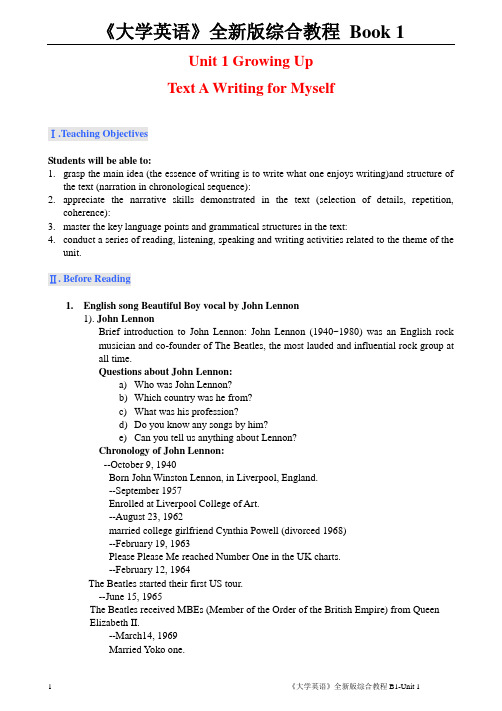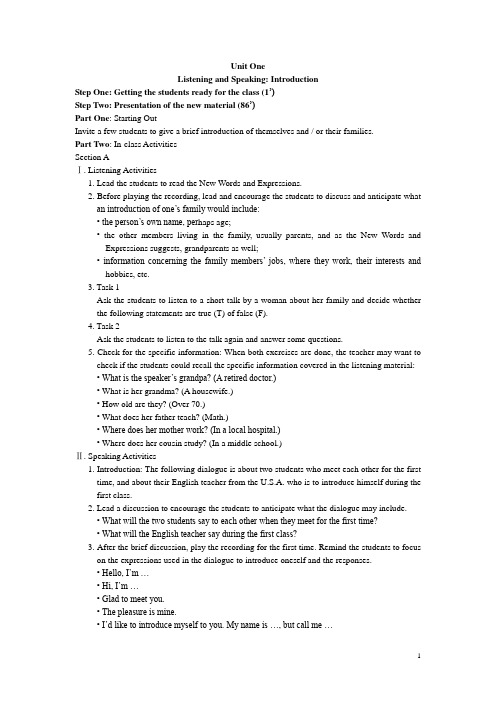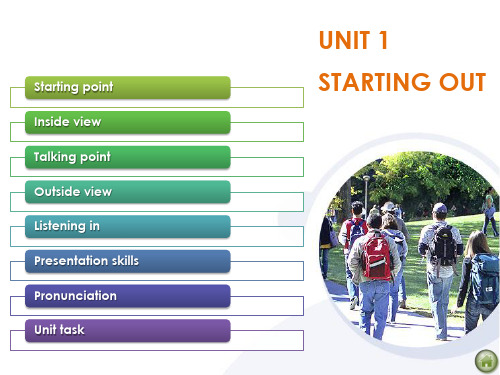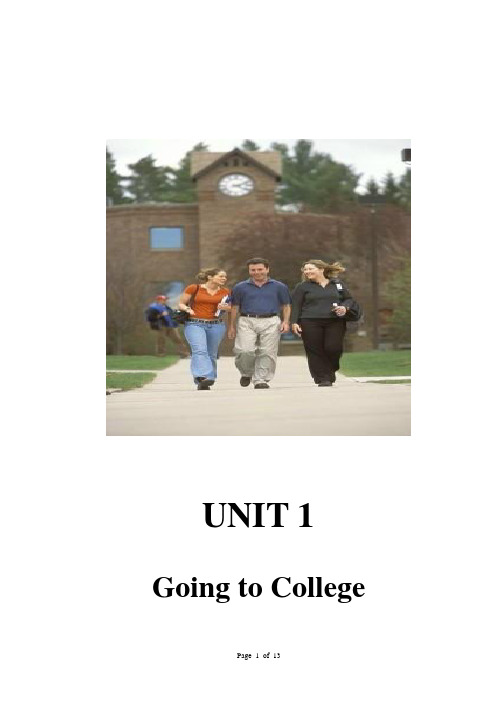B1U1-colleg-life-Transcript(textbook)-大学英语视听说教程第三版-听力原文
新视野大学英语第三版读写教程-B1U1-section-A课后练习答案

• Sarah: Excellent advice, Nancy. Simon, it seems you have something to say.
• Simon: Yes, I do. Well, I want to say you should keep a balance. College life is a mixture of social life and academic life. Don’t join too many student organizations or go to too many activities. Otherwise, you won’t have enough time to study. Of course, you should not become a book worm. The key is to keep a balance between fun and study.
虽然他未曾建立什么哲学体系未曾设立什么学派也未曾创立什么宗派但他的名字很快就变得家喻户晓英译汉p15苏格拉底是古希腊哲学家被誉为现代西方哲学的奠基人
新视野大学英语1第三版读写教程 B1U1课后练习答案
Part II key to exercises
• Section A • Pre-reading activities •1 • 1B 2D 3C 4A 5E
•
• 2 Before I left for college my parents did have a talk with me. They told me how important college experience would be in my life. They told me about the opportunities that college education would open up to me. They told me to try to develop more interests and join some student clubs. The most impressive advice they gave me was that I should not only read books about my major; instead, they advised me to read as widely as possible. All these are very valuable pieces of advice.
[VIP专享]B1U1-College Life
![[VIP专享]B1U1-College Life](https://img.taocdn.com/s3/m/523b2970dd36a32d737581d3.png)
第 1 次课教案授课章节Unit 1 College Life授课时数2教材名称当代高职高专英语第一册主编盛跃东出版社及版本06年8月1版课型新授课+练习课主要教学方法讲授、提问、讨论授课班级授课时间月日授课班级授课时间月日授课班级授课时间月日授课班级授课时间月日教学目的1、了解大学生活并掌握获得幸福大学生活的关键2、掌握一些常用词、短语和句型的用法,如:activity, require, due, increase, energy, perform, avoid, trust, show, vacation, career, campus, recall, benefit from, put…in order, take the time to do sth., make friends, deal with, result in, hunt for等3、了解翻译的基本标准,学习基本翻译技巧重点文章阅读技巧重点表达方法翻译难点重点表达方法翻译教学过程时间分配I. Lead-in Activity: discussionUnit 1 College LifeII. New Text AnalysisStep One. introduce reading skills—skimming and scanningStep Two. ask students to go over the text and do reading comprehension exercise on page 8 and 9 by using the skills of skimming and scanning 5’40’教学过程Step Three. detailed understating1. structure2. language focusIII. do exercise from page 10-13IV. Part 3 Translation and Writing V. Part 4 grammarVI. conclusion and assignment1. review text A2. preview text B and remaining exercises 18’20’5’2’课后小结:参考文献:1.Teacher’s Book 2.Longman Dictionary教学过程I. Lead-in Activity: discussion (5’)【try to get students actively involved and demonstrate their opinions】Going to college is one of our greatest dreams. After having studied hard for many years, this dream comes true at last. You must have lots of expectations from college life. Please think over the following questions.1. what kind of college students do you expect to be?2. what do you hope to do at college?II. New Text Analysis (40’)Step One. introduce reading skills—skimming and scanning【draw students’ attention to these two skills and write them down on blackboard】1. how to skimTitleIllustrationsFirst and last paragraphBody part---topic sentence2. how to scanFind out the key words in the question and locate the information in the textStep Two. ask students to go over the text and do reading comprehension exercise on page 8 and 9 by using the skills of skimming and scanningStep Three. detailed understating1. structure: two partsPart one: para.1Part two: para.2-9 (topic sentence at the beginning)2. language focusPara.11) HopeHope to do: He hopes to become a grey-collar one day.Hope for sth.: I hope for a better job.Hope that..: We all hope that we can have a happy college life.2) Live a…life=lead a …lifeLive a miserable/terrible/interesting lifepara. 23) make a schedule of=make a plan of4) write downwrite down + nwrite+ pron.+ down5) so thatpara.36)put sth in order7)If you have an assignment that requires a lot of work8)At the top of9)Be efficient in doing效率高的;有能力的,能胜任的[(+in)]e.g.: He is an efficient manager.10)Due (adj.)应有的,正当的,合适的[B]Eg. He handled it with due care.到期的[F]Eg.The bank loan is due this month.因为,由于[(+to)]Eg. Our happy childhood is due to our father's hard work.11)Be stressed about doing 紧张的,感到有压力的para.412) doing some sort of physical activity for thirty minutes three times a week willgreatly lower your stress leveldoing…动名词短语作主语Eg. Seeing is believing.13) Taking the time to exercise will help get your mind off the stress in your life.take the time to do抽时间做锻炼Eg. He takes the time to write to his parents every week.get one’s mind off sth.使某人不想某事Eg. He cannot get his mind off the coming examination.Para.514) wishWish后可接宾语从句,连词that可省略,宾语从句中的动词常用虚拟语气。
全新版大学英语综合教程(第二版)B1-Unit 1 (lecture notes)

Unit 1 Growing UpText A Writing for MyselfⅠ.Teaching ObjectivesStudents will be able to:1.grasp the main idea (the essence of writing is to write what one enjoys writing)and structure ofthe text (narration in chronological sequence):2.appreciate the narrative skills demonstrated in the text (selection of details, repetition,coherence):3.master the key language points and grammatical structures in the text:4.conduct a series of reading, listening, speaking and writing activities related to the theme of theunit.Ⅱ. Before Reading1.English song Beautiful Boy vocal by John Lennon1). John LennonBrief introduction to John Lennon: John Lennon (1940~1980) was an English rockmusician and co-founder of The Beatles, the most lauded and influential rock group atall time.Questions about John Lennon:a)Who was John Lennon?b)Which country was he from?c)What was his profession?d)Do you know any songs by him?e)Can you tell us anything about Lennon?Chronology of John Lennon:--October 9, 1940Born John Winston Lennon, in Liverpool, England.--September 1957Enrolled at Liverpool College of Art.--August 23, 1962married college girlfriend Cynthia Powell (divorced 1968)--February 19, 1963Please Please Me reached Number One in the UK charts.--February 12, 1964The Beatles started their first US tour.--June 15, 1965The Beatles received MBEs (Member of the Order of the British Empire) from QueenElizabeth II.--March14, 1969Married Yoko one.--November 25, 1969Lennon returned his MRE in peace protest.--December 8, 1980Shot dead outside his apartment in the Dakota building in New York City. The Killerwas a crazed fan, Mark Chapman, who had recently obtained Lennon’s autograph.2). Beautiful Boy3). Questions about the Song and Textsa)In your opinion, what is the song Beautiful boy going to tell us?b)What does Lennon think of growing up? Is it easy of full of adventures?c)Can you guess what the texts in this unit are going to be about?2.Spaghetti1)Definition: spaghetti is the Italian-style thin noodle, cooked by boiling and servedwith sauce. Unlike some Chinese noodles, it is not served in soup and will never tastepulpy.2)Listen and practiceRead the words given below and then listen to the passage. After listening to thepassage one student is required to come up and show the right way of eating spaghettibefore the class.i.hold the fork in your hand as if to poke the spaghetti.ii.Scoop up a small amount of spaghetti on your fork and raise it about30 cm above your plate.iii.Make sure the spaghetti on your fork is completely disconnected fromthe remainder on your plate.iv.Put the prongs of the fork at an edge of the plate that is free of food.v.Quickly point the prongs of the fork straight down toward the plateand place the points on the plate.vi.Twirl the fork to gather the spaghetti around the prongs.vii.With a quick scooping movement, gather up the roll around theprongs and place it in your month.viii.Gently gather up any stray spaghetti ends that don’t make it all theway into your mouth.3.American education systemIn the U.S., education is the responsibility of individual states, not of the federalgovernment, so requirements may vary from one state to another. The following is ageneralization:Kindergarten: under 5 years oldElementary/primary school (grades 1-6): 6-11 years oldJunior high/middle school (grades7-8): 12-13 years oldSenior high school (grades9-12): 14-17 years oldCollege, institute, academy, universityⅢ. Global Reading1.ScanningScan Text A and find out all the time words, phrases and clauses.since my childhood in Belleville (LL.1-2)until my third year in high school (L.2)until then(L.3)when our classed was assigned to Mr. Fleagle for third-year English(L.7)late in the year (L.17)until the night before the essay was due. (LL20-21)when I finished (L.40)next morning (L.42)two days passed (L.42)when I saw him lift my paper from his desk…(L.45)when Mr. Fleagle finished (L.58)3.True or false1). Baker had never thought of becoming a writer until he was in the eleventh grade. (F)As a child in Belleville, he had thought of becoming a writer from time to time.2). Tea chers found it painful to read students’ long and lifeless essays. ( T ).3). Before Mr. Fleagle became the English teacher for Baker’s class, the English course hadbeen interesting. ( F ).From the words “another cheerless year” we can see the English course had been quite boring.4). In Baker’s opinion, Mr. Fleagle was really a formal, rigid and out-of-date teacher onlybecause of Fleagle’s manner of speaking. (F)Besides the manner of speaking, Fleagle’s appearance and dress also showed that he was a dull and rigid teacher.4.Multi-choice1) At first, Baker thought Mr. Fleagle’s English course was _b__.a)interestingb)dullc)hopefuld)attractive2) In Baker’s opinion, the title of the composition “What I did on My Summer Vacation”was _d__.a)dullb)unfruitfulc)difficultd)foolish and dull3) Baker liked to write a composition with the title “ The Art of Eating Spaghetti” because_c__.a)neither Baker nor Doris had ever eaten spaghetti before.b) they argued with each other at the supper.c) it remained him of the pleasure of that evening.d) spaghetti was from Italy and quite new then.4) Which of the following statements is TRUE? _a__.a)You’ll not write a good composition until you like the topic.b)When Baker wrote the essay, he thought his teacher would like it.c)Mr. Fleagle had like Baker’s compositions before.d)Baker succeeded in writing two compositions.5.Questions and answers1. As a student, Baker was long bored by writing compositions. Later, however, hisattitude changed completely. What do you think brought about this change?By reading the text, it seems that the assignment to write an essay led to the change. However, the assignment was still there as it used to be as well asMr. Fleagle. Nothing but his own understanding toward writing an essaychanged.2. Mr. Fleagle says “it’s of the very essence of the essay”, yet he gives no furtherexplanation. Think it over. What does he mean?After reading the class Baker’s essay, Mr. Flealge told the students “it’s of the very essence of the essay”. It was clear enough for the students tounderstand what the essence was. For they enjoued the essay so much thatthey should have got a clue of how to mke the essay. Just like what Baker haddone, to write as the things are and to write for your own joy, might be whatMr. Fleagle wants to illustrate.3. How do you understand the title” Writing for Myself”?To write for oneself may be a good way in making some certain articles such as essay pr poem and so on. For by reading such an essay, the readersexpect of nothing but of the author’s individual feelings toward certainmatters.Ⅳ. Detailed ReadingImportant words , phrase and difficult sentences:Part One (para.1-2)1)(para.1)off and on : or on and off: from time to time; now and again, irregularly断断续续地,有时---It has been raining on and off for a week. That’ why the clothes feel damp.---As her patient slept soundly during the night, Nurse Betty was able to doze off andon in a bedside chair.2)(para1)take hold: become established 生根,确立---The idea of one child only has taken hold in many Chinese families---老习惯总是很难摆脱的. 这就是为什么你要在习惯养成之前戒烟..---Old habits die hard. That’s why you should stop smoking before the habit takes hold.3)(para.1)bore : vt. Make sb. feel tired and lose interest 使人厌烦---The speaker went on and on, and the audience grew bored by his speech.---Tom Sawyer grew bored with painting the garden fence, so he thought of a way to make others paint for him.Collocation:A crashing bore 讨厌之极的人/事A frightful bore 讨厌得要命的家伙An insufferable bore 讨厌得让人无法忍受的人An utter bore 极惹人厌烦的事4)(para.1))associate: vt. Join or connect together; connect or bring in the mind. 使联系起来,使联想--- 我们只是把埃及和金字塔联系起来.---We often associate Egypt with pyramids.---I can’t associate this gentle you ng woman with the radical political essays she has written,.---Jim wished to forget everything associated with his former life.*associate: n. partner, 合伙人---He is not a friend, he is a business associate.他不是我的朋友,而是我生意上的合伙人。
新视野大学英语(第三版)读写教程B1U1 Section B-What we wish

1. What did Memo‟s father say to him on his first day of school? 2. What did your parents say to you before you started your college life? 3. What are your expectations about your new college life?
Inspiring your thoughts
Task
Step 1
Previewing the text
Work in pairs and discuss the following questions.
From the title, the pictures, the first line, the first paragraph of the passage, the first sentence of each paragraph, you may discuss the following questions with your partner.
• • from the title, the salutation, the first paragraph; by skimming the passage, we may find that the first paragraph introduces the purpose of writing the letter; by reading the topic sentences of each paragraph, we may find the major details are parents‟ suggestions on the importance of college days, on learning and making friends...
新标准B1-U1-1备课笔记

Unit OneListening and Speaking: IntroductionStep One: Getting the students ready for the class (1’)Step T wo: Presentation of the new material (86’)Part One: Starting OutInvite a few students to give a brief introduction of themselves and / or their families.Part Two: In-class ActivitiesSection AⅠ. Listening Activities1. Lead the students to read the New Words and Expressions.2. Before playing the recording, lead and encourage the students to discuss and anticipate whatan introduction of one’s family would include:• the person’s own name, per haps age;•the other members living in the family, usually parents, and as the New Words and Expressions suggests, grandparents as well;• information concerning the family members’ jobs, where they work, their interests and hobbies, etc.3. Task 1Ask the students to listen to a short talk by a woman about her family and decide whether the following statements are true (T) of false (F).4. Task 2Ask the students to listen to the talk again and answer some questions.5. Check for the specific information: When both exercises are done, the teacher may want tocheck if the students could recall the specific information covered in the listening material: • What is the speaker’s grandpa? (A retired doctor.)• What is her grandma? (A housewife.)• How old are they? (Over 70.)• What does her father teach? (Math.)• Where does her mother work? (In a local hospital.)• Where does her cousin study? (In a middle school.)Ⅱ. Speaking Activities1. Introduction: The following dialogue is about two students who meet each other for the firsttime, and about their English teacher from the U.S.A. who is to introduce himself during the first class.2. Lead a discussion to encourage the students to anticipate what the dialogue may inc lude.• What will the two students say to each other when they meet for the first time?• What will the English teacher say during the first class?3. After the brief discussion, play the recording for the first time. Remind the students to focuson the expressions used in the dialogue to introduce oneself and the responses.• Hello, I’m …• Hi, I’m …• Glad to meet you.• The pleasure is mine.• I’d like to introduce myself to you. My name is …, but call me …4. Useful expressions to learn:• I’d like to do sth.e.g. I’d like to see a film tonight.• a year and a halfe.g. I’ve lived here for a year and a half.• this is my first time to do sth..e.g. This is my first time to speak to a foreigner.• one after anothere.g. We are going to do these exercises one after another.5. Task 1Ask the students to read and practice Dialogue 1 with their partners, paying close attention to the highlighted expressions.6. Task 2Ask each of the students to practice the following patterns with his/her partner, using specific information of his/her own wherever necessary.7. Task 3Role play: Ask each of the students to make a dialogue with the person met for the first time at a party, introducing himself/herself to each other.Section BⅠ. Listening Activities1. Lead the students to read the New Words and Expressions.2. Before playing the recording, tell the students that this dialogue is about two students whomeet each on campus for the first time. Elic it the students’ anticipation by asking:• What do you think they will talk about?• Will they talk about their major? If yes, how to tell about one’s major?—What’s your major?—I’m (an art) major.—I’m majoring in (computer science).• Do you think they may ask about where they live?3. Task 1Ask the students to listen to a short dialogue between a man and a woman and choose the best answers.4. Task 2Ask the students to listen to the dialogue again and fill in the following blanks with whatthey have heard.Ⅱ. Speaking Activities1. Introduction: This dialogue is between three students. Student A knows both B and C, but Band C do not know each other. A is to introduce B and C.2. Elicit expressions used to introduce two strangers by asking: What would you say if youwant to introduce one person to another? Possible answers:• Do you know A?• Let me introduce A to you.• A, this is B; and B, this is A.3. Play the recording once, and then ask the students to recall the expressions used to introduceone person to another:• Liu Jun, come and meet Li Ting.• Li Ting, this is Liu Jun …• And Liu Jun, this is Li Ting …4. Play the recording again, and ask the students to focus on the expressions used to talk aboutone’s major:• He’s a marketing major.• … this is Li Ting, a student from the Art Department.5. Task 1Ask the students to read and practice the Dialogue 2 with their partners, paying close attention to the highlighted expressions.6. Task 2Ask each of the students to practice the patterns with his/her partner, using specific information of his/her own wherever necessary.7. Task 3Role play: Encourage or ask two or three groups to act out introducing two strangers and, if the students are from different departments, talking about their majors.Section CⅠ. Listening Activities1. Lead the students to read the New Words and Expressions.2. Before playing the recording, tell the students that they are going to listen to a dialoguebetween three people: a Chinese student brings his cousin to see an American teacher.Questi ons for elicit the students’ responses:• How does the Chinese student introduce the other two?• What will they say to each other?• How are they going to greet each other?3. Task 1Ask the students to listen to the dialogue and decide whether the following statements are true (T) or false (F).4. Task 2Ask the students to listen to the dialogue again and answer some questions.Ⅱ. Speaking Activities1. Introduction: This dialogue is similar to the one in the above listening activities in that thereare also more than two people.2. Play the recording once. Check the students’ comprehension by asking:• How many people are there in the dialogue? Who are they?• Where does the dialogue take place?• What does Li Ting say to begin the introduction? (I don’t think you two have met each other before, have you?)3. Ask the students to recall the order of the two persons being introduced: Michael (junior) isfirst introduced to Mr. White (senior). Note: Refer to Culture Note 3, the order of introduction. Then play the recording again and let the students read the dialogue while listening.4. Task 1Ask the students to read and practice the Dialogue 3 with their partners, paying close attention to the highlighted expressions.5. Task 2Ask each of the students to practice the patterns with his/her partner, using specific information of his / her own wherever necessary.6. Task 3Role play: Encourage or ask the students to act out introducing one of their classmates to the other in groups of three, using He / She is… or His / her name is …Part Three: Culture Notes1. Ask the students to read this part on their own.2. The teacher may check if they have read it by asking the following questions:• How would Americans like to be addressed? (By their first names.)• What is more popular way to address a woman? (Use “Ms.”)• When introduce two people, what is the proper sequence? (Man to woman, junior to senior.) • Is it popular for Westerners to hug each other? (In many cases, yes.)• Do you have an English name? Why do you have one? (Follow the fashion or for the sake of helping foreigners to remember your name.)Step Three: Summary (2’)1. Different expressions to introduce oneself2. Different expressions to introduce two strangers3. Different expressions to greet each other4. The order of introductionStep Four: Assignment (1’)Finish Part Four.。
新标准视听说b1u1 - 1

Conversation 3
Inside view
Conversation 3
Scripts:
Kate: Hey! This is awesome! Look at the size of this dining hall.
Janet: Is this where we have all our meals?
Kate: I guess.
Mark: You just arrived?
Activity:
Work with your partner and form a dialogue based on the above conversation.
Inside view
Check the answer
(1) I’m Janet Li. (2) My Chinese name is (3) it’s short for Catherine. (4) Everyone calls me Kate.
The porter asks Janet to sign for her keys.
Inside view
Conversation 1
Scripts:
Porter: Good afternoon.
Janet: Good afternoon.
Porter: New student?
Janet: Yes.
Porter: And what's your first name, Ms Li?
Janet: Janet.
Porter: Janet Li... ah yes, there you are. Here are your keys.
Janet: Where's my room?
视听说B1U1(part 2)

Understanding a Long Conversations (LS Page 4) • Now you will hear a long conversation followed by five questions. Listen carefully and choose the best answer from the four possible choices.
(4) W: I keep on making new friends as I study online. C M: So do I! There are so many people online, and I want to meet them all! Q: What is one benefit of studying online? (5) M: My online teacher asked the class for suggestions to make the class better. D W: That’s great! I always like it when a teacher does that. Q: What did the man’s teacher want to do? (6) M: I had no idea that online language learning could be so effective! C W: It sure has helped me practice my language skills! Q: What is it about online language learning that surprised the man? (7) M: My classmates and I help each other solve homework problems online. C W: It sounds like you’re using the Internet in a useful way. Q: What does the man do online?
新视野英语教程读写教程B1-U1

UNIT 1 Going to CollegeTOPICGoing to CollegeI LEADING INEntering college for the first time is an exciting moment in your life. Think about why you decided to go to college. You may have several reasons. But, whatever the reasons, use your time wisely to work hard,enjoy meeting new people and prepare you for a bright future.II EXPLORINGNow you are a college student, happy and proud! Sure, in college you’ll have more time to yourself! And sure, you’ll have to decide how to spend your own time and how to make the most of it. Now please discuss the following questions with your partner.1.What’s your purpose of going to college?2.What does going to college mean to you?SECTION AHow to Be Cool at CollegeI Language Points1. educationn.[U]the process by which a person's mind and character are developed through teaching, especially through formal instruction at school or college(尤指正规的)教育;培养[例] higher education高等教育[例] She has had a good education. 她受过良好的教育。
- 1、下载文档前请自行甄别文档内容的完整性,平台不提供额外的编辑、内容补充、找答案等附加服务。
- 2、"仅部分预览"的文档,不可在线预览部分如存在完整性等问题,可反馈申请退款(可完整预览的文档不适用该条件!)。
- 3、如文档侵犯您的权益,请联系客服反馈,我们会尽快为您处理(人工客服工作时间:9:00-18:30)。
And as far as my karate belt is concerned,senseitold me to start with the basics of bowing.
“Wonderful!”
“How was that?”
Not bad for my first try, but it may take me a little longer to get the rest.
And anew club has recently been formed, the Shotokan Karate club. It’sakind of karate that combines basics, patterns of moves and sparring.
(Melarie Taylor)“The students are self-motivated. If they’vesignedupfor the class and they decided to stay,thenthey like the high-energy demand, and they like the vibes of the class and people training.”
Nowwhile we only got to touch on a few clubs here at Concordia, there is a whole wealth of informationon the dean of student website at Concordia. ca.
Maybe you could be a great writer -- maybe even good enough to write a book or articles in a newspaper -- but you might not know it until you write that English paper -- that English class paper that's assigned to you. Maybe you could be an innovator or an inventor -- maybe even good enough to come up with the next iPhone or the new medicine or vaccine -- but you might not know it until you do your project for your science class. Maybe you could be a mayor or a senator or a Supreme Court justice -- but you might not know that until you join student government or the debate team.
CassandraKeating moved toMontrealfromSaskatoontostudy journalism.
“So it’s still a process. I’m still getting used to the city andbeingbackinschool.”v
There are manytypes ofclubs that Concordia students can join. Many of them areregistered with the Concordia Student Union.
And no matter what you want to do with your life, I guarantee that you'll need an education to do it. You want to be a doctor, or a teacher, or a police officer? You want to be a nurse or an architect, a lawyer or a member of our military? You're going to need a good education for every single one of those careers. You cannot drop out of school and just drop into a good job. You've got to train for it and work for it and learn for it.
Some groupslike HILLEL also know how to throБайду номын сангаас a party.
(David Adelman) “First of all,I make really fun parties. Sowe make parties, I get to have fun. I ring my friends and after a whilea lot ofmy friends are having so muchfun, they actually join HILLEL,too.”
(Jean-Philippe)“Karate has to be friendly.That’s our motto.We are friendlywithpeople, we don’tlook for … we don’twant any tension between people. So, that leads to, naturally, tofriendship.”
Lesson 1Audio 1
Obama
That's what I want to focus on today: the responsibility each of you has for your education.
I want to start with the responsibility you have to yourself. Every single one of you has something that you're good at. Every single one of you has something to offer. And you have a responsibility to yourself to discover what that is. That's the opportunity an education can provide.
(Brian Joseph)“When I first started, it was a smaller group,it was very tight in,and just over a year, I’ve justsee expand,andmore people join. More people come with friends and friendsand network, andjust this huge family, and it’s justa really great thing to see.”
Lesson 1Video
Student report–join a club
Starting a university career can be an intimidating event for some people. Making new connections isn’t always easy. One of the best waysto meet people is to join a club. At CJLO, the university’s radio station,people volunteer asradio DJs, news readers or technicians.
Yale’s Graduate School of Artsand Sciences, the first schoolto award PhD in the united States, offersprograms leading to PhDandMaster’s degrees, andisknown for its academic excellence, extraordinary resources, and world-class faculty. Today more than one third of its students come from abroad. Every PhD student in the school pays no tuition and receivesthe generous annualstipendfor living expenses.
Lesson 1Audio 2
Intro to Yale college and graduate school
Yale College, the undergraduate school, is the heart of the University. It’s been setting the standardforeducating American leaders for over three centuries. One of Yale’smostdistinctive assets is its residential college system, 12 collegesare diverse, yetintimate communities of400 students, providing all of the benefits of a small college along with theresourcesof a great research university. Each collegehas its own dining hall, library, gymnasium, and multi-purpose rooms, which students use for everything from theatrical productionsandconcerts to publishing newspapers. The colleges also offer seminars, host speakers, organize socialevents, sponsor sporting teams and provide tutoring. The residential college system ensures students at Yale have a support structure that fostersrelationships that will last a lifetime.
